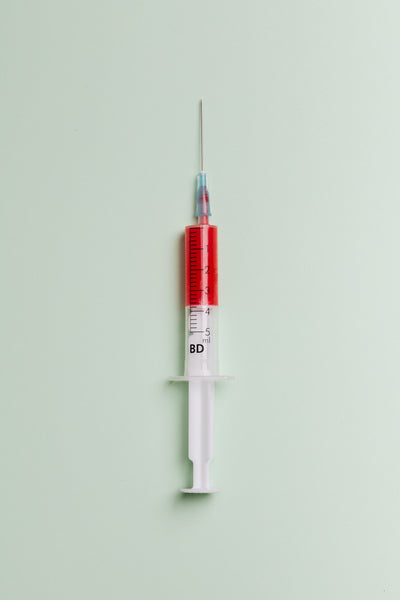What is the RhoGAM shot used for during the pregnancy?
RhoGAM is an immunity support injection administered during pregnancy for people with a negative blood type.
The purpose of the RhoGAM shot is to prevent problems that occur due to the baby’s positive blood type. It helps prevent the body from developing Rh antibodies.
Antibodies are proteins that our immune system makes to fight against foreign substances. The formation of Rh antibodies can cause the baby to be born with hemolytic disease.
During pregnancy, you need to know if your body has the Rh protein or not. If you don’t, you should get a RhoGAM shot.
What is the Rh factor?
Rh factor is a protein that most people carry in their blood. If your blood cells have this protein, it means you are Rh-positive. The majority of the people have a positive Rh factor. Children inherit it from one of their parents through their genes.
During pregnancy, problems can arise if you are Rh-negative and your fetus is Rh-positive.
Treatments are available to deal with such complications and you need such treatments during pregnancy to protect you and your baby. Rh factor testing is necessary during the pregnancy, especially if you’re planning to have more children later on. It is important to get tested and get the treatment if needed.
Problems do not occur during the first pregnancy when an Rh-negative person has an Rh-positive fetus. At this stage, the body does not develop very many antibodies.
However, if treatment is not sought during the first pregnancy, the body can make more antibodies in subsequent pregnancies, which can put the fetus at risk.
What is Rh incompatibility?
When the mother has a positive Rh factor, and the baby’s father is Rh-positive, there may be complications if the baby inherits the dad’s Rh factor. This is called Rh incompatibility.
The chance of inheriting the mother’s Rh factor is more than inheriting the father’s Rh factor. We can determine the Rh incompatibility by taking blood samples and testing them.
Rh incompatibility is not a problem during your first pregnancy. But once your immune system starts to respond, there is a risk of hemolytic disease for future Rh-positive fetuses. It is a serious condition that may cause jaundice, anemia, brain damage, or even heart failure.
How is RhoGAM injected?
The production of antibodies can cause problems during pregnancy. Therefore, surrogates should get a RhoGAM injection. It is a common treatment and injected into soft tissue or muscle, often in the backside. It is up to the doctor to decide on the best methods to administer this injection and how much the dose should be. Once the shot is administered it will remain effective for about 13 weeks.
This treatment helps to overcome the problems, and you need frequent blood tests to monitor Rh levels through the pregnancy.
It is possible that a small amount of the baby’s blood might enter the mother’s bloodstream. It can result in blood mismatch and cause problems. The immune system treats the baby’s blood cells as foreign and starts producing antibodies to eliminate them.
As long as the mother with Rh-negative gets RhoGAM shot appropriately during the pregnancy, there is a low risk of developing hemolytic diseases.
When do pregnant women get the RhoGAM shot?
If you determine that you and your baby have Rh incompatibility, you need to get a RhoGAM shot at 28 weeks of pregnancy. Rh-positive blood cells from the fetus may get exposed to Rh-negative of the mothers during the last few months of pregnancy. The body of the woman starts making antibodies against these cells. Rh injection during the 26 to 28 weeks prevents the body from developing antibodies.
It is also necessary to inject a RhoGAM shot within 72 hours of delivery to prevent the risks that could affect a future pregnancy. Each pregnancy and delivery require a separate dose and treatment.
RhoGAM and Surrogacy Pregnancy
In a gestational surrogacy the need for a RhoGAM shot is just as important as in any other pregnancy when the surrogate is Rh-negative and carrying a baby with Rh-positive blood. This shot helps prevent Rh incompatibility, which could otherwise cause the surrogate’s immune system to create antibodies that might affect current or future pregnancies. Intended parents and surrogates should ensure Rh factor testing is completed early in the process and that RhoGAM is administered as recommended—typically around the 28th week of pregnancy and again after delivery if needed. Communication between the fertility clinic, OB-GYN, and agency is key to managing this aspect of care. You can learn more about the other tests and steps of the surrogacy process here.
Side Effects of RhoGAM shot
RhoGAM is a safe treatment and prevents the body from developing antibodies. It also protects the baby from Rh diseases. However, there could be side effects of injection RhoGAM shots, which include:
- Rashes or redness, aches, pain, or swelling at the injection site.
- A slight fever or an allergic reaction.
- Pain, discomfort or tenderness.
- Joint or muscle pain, headache, dizziness, weakness, and tiredness.
- Nausea, diarrhea, vomiting, or stomach pain.
The serious side effects are chills, back pain, shortness of breath, rapid weight gain, bleeding, and urinating less than usual. You need to consult the doctor if you face any of these side effects.
There is a chance that other medicines may interact with RhoGAM and cause complications. Tell the doctor about all the prescriptions you are using. Do not take any medication without consultation.
When not to get RhoGAM shot
- Do not inject a RhoGAM shot if you have a severe allergic reaction to immune globulin.
- It should not be administered if you already have positive antibodies.
- If you have hemolytic anemia, it can cause issues.
- If you received a recent vaccination, RhoGAM might reduce its effectiveness.
RhoGAM Shot – Important Information
Make sure that immune globulin is safe for you and tell the doctor if you have anemia, a heart or kidney disease, high triglycerides, diabetes, or a history of coronary artery disease.
This drug is often used during and after pregnancy and not harmful to the baby. When you get pregnant, it is necessary to get tested and know if you are Rh-positive or Rh-negative. You’re your doctor if you have ever been exposed to Rh-positive blood. The history of exposure is important to note in order to get timely treatment.
You should be aware of other potential risks because RhoGAM is made of human plasma. It may contain infectious agents that can cause diseases. Although, viral inactivation steps are added to the manufacturing process to minimize the risk of diseases. But still, all risks can not be eliminated.
About SurrogateFirst
SurrogateFirst is a boutique surrogate agency specializing in quickly matching intended parents around the world with our fully-vetted, exceptional surrogates.
We help individuals and couples, regardless of race or sexual orientation, build their families through the miracle of surrogacy.
Every team member at SurrogateFirst is either a former intended parent or an experienced surrogate herself. We also have first-hand knowledge of what it takes to have an incredible, successful surrogate journey.





